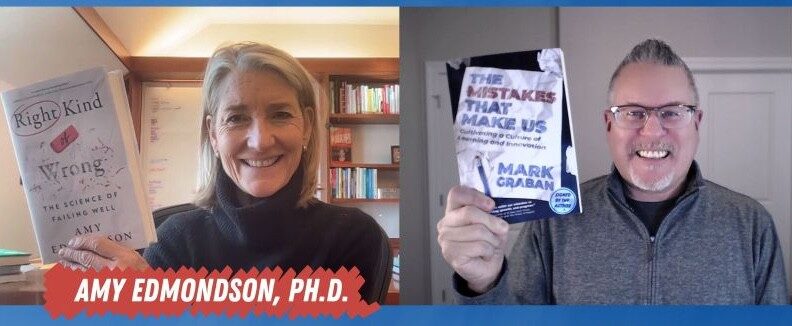I don't share every episode of the “My Favorite Mistake” podcast here, but today's new episode has great connections to Lean, I think. Or, it's Lean-adjacent.
It's a discussion I had with Prof. Amy C. Edmondson, from Harvard Business School, about her latest book, Right Kind of Wrong: The Science of Failing Well.
In the episode, we discussed the connections between mistakes and failures. We agree that some failures, but not all, are caused by mistakes. We also agree that we should shift away from “fail early, fail often” to something closer to “fail early and small, learn, adjust, and then succeed.”
So, basically, the “Deming Cycle” that we embrace in Lean practice — Plan, Do, Study, Adjust. Doing this well requires psychological safety. People have to feel safe pointing out opportunities for improvement. They need to feel safe to test an idea that's not guaranteed to work. They must feel safe to admit a small failure and adjust. It's the role of leaders to create this culture of psychological safety. l

You can learn more on the episode page, which has a transcript, summary, and more, but I'll embed both the audio and video versions below for convenience.
Listen:
Watch:
I also highly recommend this previous episode of “Lean Blog Interviews” where I interviewed Amy about her previous book The Fearless Organization and psychological safety:
I hope you enjoy the episodes. Please post a comment to share what you think about the topics, her books, and more.
Speaking of my book again, The Mistakes That Make Us: Cultivating a Culture of Learning and Innovation, you can still enter to win a signed copy from me as part of the complete set of my books (six signed copies).
Please scroll down (or click) to post a comment. Connect with me on LinkedIn.
Let’s build a culture of continuous improvement and psychological safety—together. If you're a leader aiming for lasting change (not just more projects), I help organizations:
- Engage people at all levels in sustainable improvement
- Shift from fear of mistakes to learning from them
- Apply Lean thinking in practical, people-centered ways
Interested in coaching or a keynote talk? Let’s talk.
Join me for a Lean Healthcare Accelerator Trip to Japan! Learn More









